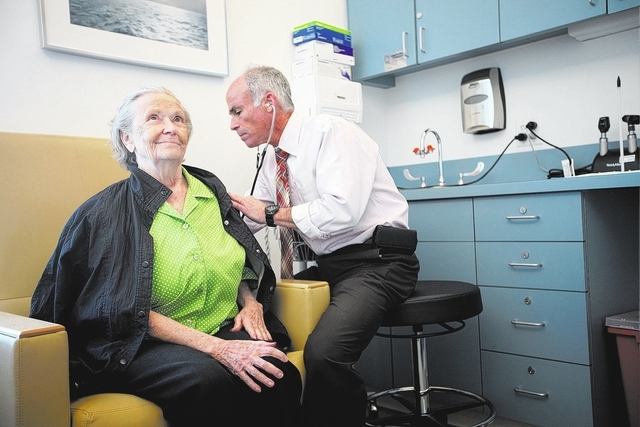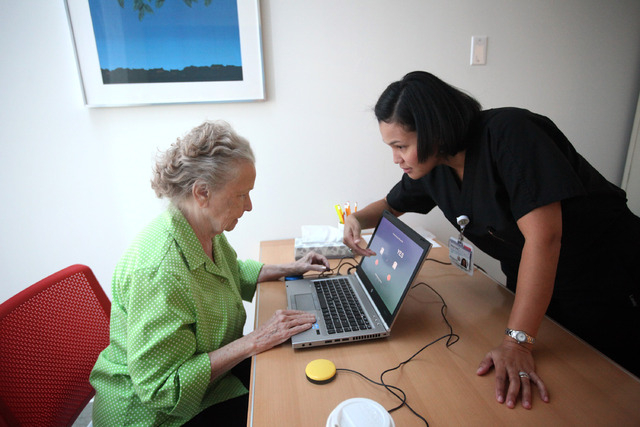Ruvo Center trial researches skin cancer drug for Alzheimer’s use


Warren and Pat are a retired Summerlin couple dealing with posterior cortical atrophy, a variant of Alzheimer’s disease. Pat’s symptoms began four years ago with her eyesight.
“It broke my heart because I love to read. I always had my nose in a book,” she said. “We just thought it was old age.”
She tried new glasses and new vision doctors, but she had to surrender her driver’s license.
“No matter what she saw, the brain would see something different,” Warren said. “She can reach for things, and all of a sudden, they’re not there anymore. But if she keeps reaching, there it is.”
PCA is almost always a result of Alzheimer’s disease. The disease causes shrinkage (atrophy) of the back of the brain where vision is processed, and it gets progressively worse. Most cases have an abnormal accumulation of proteins.
Now, Pat is one of about a dozen people in a clinical drug trial at the Cleveland Clinic Lou Ruvo Center for Brain Health, 888 W. Bonneville Ave. She takes two pills twice a day.
Dr. Dylan Wint, her doctor, told the couple of a new clinical trial being led by Dr. Jeffrey Cummings, director of the Ruvo Center, who has been a neurologist for 33 years, and Dr. Kate Zhong, senior director of clinical research and development. Their clinical trial studies the drug bexarotene, a drug intended for skin cancer.
“We had seen the publication on the animal work that had come out this year, and we realized there was an unusual opportunity to follow up with a clinical trial, so we put it together right away,” Cummings said.
He and Zhong had it reviewed by the FDA and raised about $1 million for the study. They began the trial in June with 10 patients but will eventually follow 20. Larger trials can cost upwards of $60 million, Cummings said of the two-month study.
“It’s short, as trials generally go, because the response in the animals was seen very early,” Cummings said. “They made a measurable change within six days of treatment. So, we’re trying to see if anything like that will happen in people.”
The trial is broken into two parts. In the first month, 16 patients get the drug, with four others receiving a placebo. In the second month, all 20 receive the drug. The identity of the four who initially receive the placebo will not be known until the end of the study when results are compared.
The study includes a full repertoire of clinical assessments for memory and incognition, interviews of the caregiver about observed changes in the daily living of the patient such as being more engaged in conversation, and other neuro-psychiatric symptoms to see if there’s anxiety or agitation in the patient. A standard set of clinical observations used in most Alzheimer’s trials was also utilized.
Bexarotene is an example of repurposing trials for spin-off use. Cummings said that already having the drug get the green light for skin cancer cut the drug’s development time for possible Alzheimer’s use by about a third.
“We’re desperate to get these drugs to our patients as soon as possible, so those two or three years are extremely precious,” he said.
The mice had shown a quick and profound response to the drug.
“It was just days,” Cummings said. “I thought, ‘Let’s get on this, let’s be the leader. Let’s make something out of this observation.’ ”
Cummings said that even if the drug did have notable changes in Alzheimer’s patients’ plaque levels, he suspected that full restoration of their functions would not occur as cell death had already taken place.
He called his study a gateway study. If results are positive, a larger study, likely about 400 and 600 people in various cities, would be needed for FDA approval.
“We’re really excited about the fact that we are the only site in the country that is doing this study,” Cummings said. “I think it really is a landmark study.”
Cummings said there are about 35 trials at the center that cover Alzheimer’s, Parkinson’s disease and multiple sclerosis. November is Alzheimer’s Awareness Month.
“We’re probably the largest Alzheimer clinical trial site in the country in terms of the number of trials that we have,” he said. “We’ve had a very successful program primarily because the people of Las Vegas understand that this is important, that this is an opportunity to make a contribution to their own disease and to the disease of people across the world.”
As for Warren and Pat, they said they would like to believe it will help — halfway through the study, Pat reported no noticeable changes — but said just to be part of the study was an opportunity.
“It’s an opportunity to see if this drug really works,” Warren said. “And if it does, she’ll benefit from it. But just being a study subject, (it will) let somebody learn something.”
Editor’s note: Warren and Pat asked that their last name not be used in this story.
Contact Summerlin/Summerlin South View reporter Jan Hogan at jhogan@viewnews.com or 702-387-2949.












